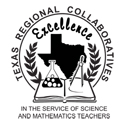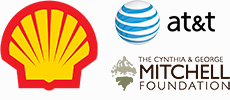TRC Participation in HESTEC Week 2011
 The TRC was very happy to join its corporate partner Shell in participating in the 10th annual HESTEC Week held September 26 – October 1, 2011 at the University of Texas-Pan American in Edinburg, Texas. Dr. Debra Junk, the TRC’s Coordinator for Mathematics Initiatives, led two mathematics sessions based around activities designed to expand middle school students’ understanding of Science, Technology, Engineering, and Mathematics (STEM) in both a historical context and how it relates to STEM field careers.
The TRC was very happy to join its corporate partner Shell in participating in the 10th annual HESTEC Week held September 26 – October 1, 2011 at the University of Texas-Pan American in Edinburg, Texas. Dr. Debra Junk, the TRC’s Coordinator for Mathematics Initiatives, led two mathematics sessions based around activities designed to expand middle school students’ understanding of Science, Technology, Engineering, and Mathematics (STEM) in both a historical context and how it relates to STEM field careers.
Both sessions centered on using a combination of ancient and modern methods to find the height of objects from a distance where directly measuring the tree, flagpole, or building is not practical. This included using both clinometers and some creative body positioning to estimate the height of objects. Both methods involve understanding angles and the properties of triangles which are part of the middle school TEKS.
The first session, held on Educator Day, involved introducing teachers to the lesson and providing them with the knowledge and materials necessary to replicate the activities with their own classes as well as share the lesson with fellow teachers back home. Students taking part in Student Leadership Day participated in the second session. While working through the activities, students were encouraged to form hypotheses about the accuracy of the different measurement methods and to answer those questions through completion of the activity. This way students learn not only the skills and concepts being taught, but also helps them understand measurement is always going to be an approximation and the exactness depends on both the reliability of the tools and the skills of the measurer.
Dr. Junk was also featured in a video highlighting the contributions of Shell and the TRC to the HESTEC event. (Watch on YouTube)
Texas Regional Collaboratives Conference Focuses on Leveraging Partnerships for Teacher Success
 Excerpt from article:
Excerpt from article:
Transformational. Inspiring. Energizing. Amazing. Highly effective.
Odds are, you’ll hear at least one of these words or phrases during any conversation about the Texas Regional Collaboratives (TRC) for Excellence in Science and Mathematics Teaching – and they were used in abundance at this year’s 17th annual TRC conference, which was held June 28-30 at the Renaissance Austin Hotel.
The theme of the 2011 conference was “Leveraging Partnerships to Maximize Teacher Quality,” emphasizing a core feature that’s made the Collaboratives a uniquely successful initiative for almost two decades – the strong and diverse network of over 60 P-16 partnerships around Texas.
The multi award-winning TRC offers sustained, high intensity professional development training to elementary and secondary science, technology, engineering and mathematics (STEM) teachers in every county in Texas. This is made possible by the support of Texas Education Agency, corporate sponsors, Texas universities, regional education service centers, policy makers, government agencies, communities and school administrators.
Shell Features its Partnership with the TRC in Online Article, Growing Our Own Einsteins
The article, Growing Our Own Einsteins, recently appeared on www.shell.us
 Excerpt from article:
Excerpt from article:
“The United States is lacking the engineers and scientists we need to remain competitive. The problem stems from the fact that we don’t do a good job at the elementary and middle-school level in helping our students become excited about STEM subjects and giving them the skills to pursue science-related careers,” explains Dr. Kamil Jbeily, executive director of the Texas Regional Collaboratives at the University of Texas at Austin.
Dr. Jbeily suggests one of the reasons students are not learning science early on is because of an inadequate background in the subject matter by elementary and middle school teachers, who are expected to be experts in all subjects, not just one.
“Studies show that teacher quality, more than any other factor, is a key determinant of student success,” Dr. Jbeily says.
The TRC’s answer to the problem? Equip kindergarten through 8th-grade teachers with skills to provide high-quality science instruction, effectively communicate a positive attitude about STEM subjects and help inspire students to pursue STEM-related careers.
Through TRC professional development and mentoring, 17,000 elementary and middle school teachers have received hands-on instruction from university-level science professors and then have taken their learnings back to public schools to share with other teachers. The multiplier effect means that 30,000 teachers have improved the learning experiences of more than two million students in the State of Texas.
Continue reading on Shell’s website.
Our Lady of the Lake Science Collaborative Teacher, Kent Page, Named a Texas Finalist for PAEMST
 Mr. Kent Page, a long-standing member of Our Lady of the Lake Science Regional Collaborative in San Antonio has been named a finalist for the prestigious Presidential Award for Excellence in Mathematics and Science Teaching (PAEMST) program. Peggy Carnahan, his Collaborative Director, says that Kent has been a role model for other teachers in their collaborative and has been an active member since 2005.
Mr. Kent Page, a long-standing member of Our Lady of the Lake Science Regional Collaborative in San Antonio has been named a finalist for the prestigious Presidential Award for Excellence in Mathematics and Science Teaching (PAEMST) program. Peggy Carnahan, his Collaborative Director, says that Kent has been a role model for other teachers in their collaborative and has been an active member since 2005.
This year, the PAEMST program recognizes kindergarten through sixth grade mathematics and science teachers whose innovative methods bring teaching to life in the classroom. According to the Texas Education Agency, it is the highest recognition that a mathematics or science teacher may receive for exemplary teaching in the United States. Page is one of six finalists in Texas and now moves on to the national competition. A panel of distinguished scientists, mathematicians, and educators may select one math and one science teacher from each state and U.S. jurisdiction for the national award. National winners receive $10,000, an all-expense paid trip for two to Washington, D.C. to attend recognition events, and a citation signed by President Obama.
Page, who currently teaches science at Carnahan Elementary School, started his career in Northside ISD working with severely emotionally disturbed students. His principal, Lisa Turner, said that he is a phenomenal teacher who brings science to life in his classroom and inspires a passion for learning. “He is all about letting kids get dirty and hands-on to learn about science. He believes that by actually doing, they will remember, and they do. His lab is the most popular room in the entire school.” Page and the other Texas nominees were recognized by the Texas Education Agency in January. To learn more about PAEMST and the award ceremony, checkout the January 2011 edition of Texas Education Today.
When asked to respond to the Award, Page stated, ” I feel the most appropriate response to the Presidential Award is as an opportunity to recognize the many teams, collaborators, and individuals who made possible the project, the ‘Creek Patrol,’ cited in the award. Special thanks for the graduate education degree courses in science, and the many workshops provided by the Center for Science and Math headed by Peggy Carnahan at Our Lady of the Lake University in San Antonio with support and grants from our Texas Regional Science Collaborative.
“The TRC provided me and so many of my colleagues, with the skills and materials required to move students out of the classroom, so they could study the natural world outdoors. My principal was willing to trust my ideas because of the solid educational structure I could demonstrate using the models provided by the TRC and taught to us all in the numerous conventions, conferences, and workshops continually offered by the TRC.
“My campus is near the center of our district in terms of demographics, yet our student science scores were among the top on the TAKS test. On my campus, I work with all students, but the Creek Patrol is used primarily as an intervention program for students with low science scores on the premise that students must do first-person observations and investigations to build the cognitive structure in order to think about the important concepts in science. As all of us who teach science have seen, these unsuccessful students can blossom when given the chance to conduct their own air, soil, and water measurements outdoors on a regular weekly basis. The structure of these studies was Change over Time in the cycles of nature, but our data, protocols, and documentation also captured how much the students themselves changed over time from reluctant learners to enthusiastic young scientists. Lab data sharing and analysis followed by preparation for the next field observation, instrument certification, performance based assessment, and team/leadership roles helped move these low scoring students to passing and even commended.
“The investigations done by the Creek Patrol, and the successes of the students in it flow directly from the encouragement, support, and ideas provided by the TRC. You helped me believe I could do it. On behalf of my students, many now in middle school who continue to contact me for Creek Patrol data they use for reports and projects in middle school, thanks for your help and guidance. Despite budget cuts, the Creek Patrol concept is being extended to 6 other elementary campuses in our district with a goal of generalizing this hands-on inquiry science activity to the lowest scoring students on other Title 1 campuses. Far more than my gratitude, it is the continued academic success of these students which most endorses the irreplaceable work done by the TRC.”
TRC Teacher Stef Paramoure wins Presidential Award for Excellence in Science Teaching

Congressman Lamar Smith Congratulates
Stef Paramoure in Washington D.C
President Obama honored TRC middle school teacher Stef Paramoure on December 15, 2010 as the Texas science teacher recipient of the Presidential Award for Excellence in Mathematics and Science Teaching (PAEMST). Awards were announced in June of 2010 and 103 recipients representing math and science teachers from all 50 states, Puerto Rico, and the Department of Defense. Each awardee received a $10,000 check from the National Science Foundation as well as the all-expense paid trip to Washington, D.C. Teachers in grades 7-12 were eligible for consideration this year.
Stef was nominated by TRC Assistant Director Carol Fletcher and worked at Comal ISD at the time of the nomination. She has been a member of the Region 13 Science Collaborative, led by Project Director Jennifer Jordan-Kaszuba. “For the last three years, Stef has energized and encouraged her fellow teachers while sharing her love and knowledge of science teaching,” stated Jordan-Kaszuba.
Stef is currently an eighth grade teacher in Houston ISD and continues to work with the TRC as well as other professional organizations to share her expertise and enthusiasm. Stef is quick to credit the TRC with giving her the support and tools she needed to grow professionally. “I am indebted to the Texas Regional Collaboratives for my growth in science content and purposeful pedagogy. This organization has impacted not only my life, but also those of my students and the students of teachers with whom I have shared information. Knowledge is power and the TRC has enabled me to become a powerful teacher. Earning the PAMEST validates how quality ongoing professional development is crucial to improving education and inspiring the next generation to pursue STEM careers.”

Stef Paramoure holding Presidential citation between the Director of the National Science Foundation, Dr. Subra Suresh and the Director of the White House Office of Science and Technology Policy, Dr. John P. Holdren.





